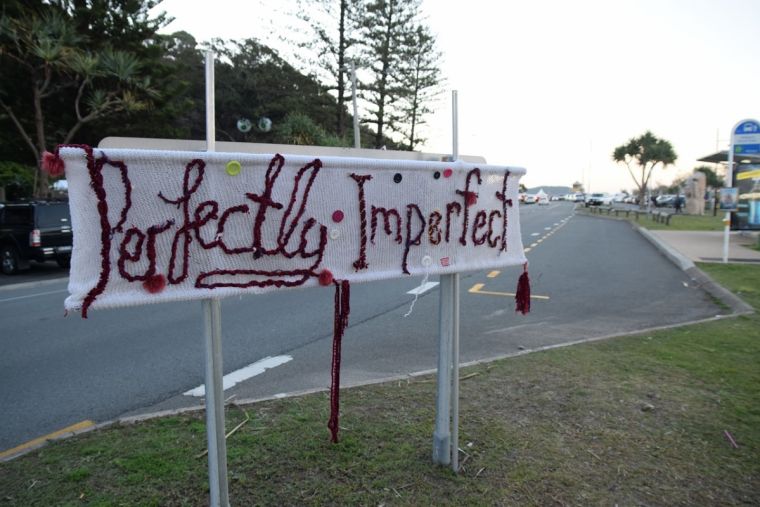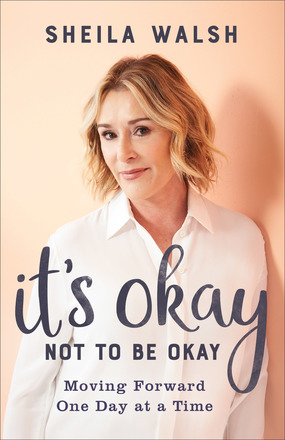It's OK not to be OK: Why we need to learn to live with imperfection
During the 1980s Scottish-born Sheila Walsh was a solo contemporary Christian singer and TV talk show host. She studied theology and became an author, writing about her struggles with depression in her book 'Honestly' (1996). She is now co-host of the TV programme 'Life Today', broadcast in the US, Canada, Europe and Australia with over 300 million viewers daily, as well as continuing her musical career and a wider ministry through Life Today.
In her new book, 'It's Okay Not To Be Okay', she acknowledges that life is often not as we imagined or hoped it would be. She encourages readers to face the pain head on and then start again, from right where they are. This is an extract used with permission.

Monday-Morning Jesus
What happens between Sunday and Monday? Why does it feel like Monday-morning Jesus is not as clear and present sometimes as Sunday-morning Jesus? When we leave the service on Sunday, we believe certain things to be true:
I am a child of God.
God loves me just as I am.
All things work together for good to those who love God.
God is for me.
My prayers matter.
Yet, as we move into the week, it's harder to believe that God loves us just as we are because, honestly, we don't love ourselves just as we are. There are always things we want to change about ourselves. We compare ourselves to other moms in the carpool line or at work, and we don't always come off well.
I remember Christian's first morning in second grade after we'd just moved to Dallas. I went into his classroom with all the other moms and saw that several of them were in little tennis skirts with tanned and toned legs. My legs haven't been tanned or toned since...well...never mind. One mom introduced herself to me and gave me a card (I kid you not) for Dallas's best plastic surgeon. I remember muttering something like, if I'm ever in a car accident, I'll call. Crazy stuff!
Most situations are not that extreme, but I think we all do it. We compare ourselves to what we see in others, and when we do we think that we'll never be enough. What we need to remember, though, is that other women are comparing themselves to others too. It's a vicious game of smoke and mirrors and no one wins.
What about believing that all things work together for good to those who love God? What happens to that when something really hard hits your family? How can what's happening right now be good? It's hard not to ask that question in the back of your mind: Is God really listening to my prayers, because nothing seems to be changing?
Perhaps your situation is even harder than that. You don't even feel God's presence in church. Maybe you stopped going because of something someone said to you, or you look at everyone else around you who seems to be 'getting it', and you, if you're honest, don't. You may have talked about something you're struggling with in a small group, and you could tell by the reactions of others that they were shocked. Now they look at you differently. That's a very lonely, isolating place to be.
I want to say something loud and clear in the first chapter: it's okay not to be okay! The bottom line is that we were never designed to be everything to everyone. Life is hard, and we all face problems. Those who say they don't have any problems are doing one of two things:
1. Hiding their problems
2. Pretending they don't have any
I'll get back to that in a moment.
I want to be clear that this is not a self-help, feel-good-about-yourself book. That might help for a moment, but when the first storm hits every word would vanish like the morning mist. What I want us to look at is this: What does God say about who we are? Does God expect us to have it all together, and why do we always feel that there's something not quite right with everything? For that we'll have to take a look back in our history – way, way back.
Plan A
The Lord God caused the man to fall into a deep sleep. While the man slept, the Lord God took out one of the man's ribs and closed up the opening. Then the Lord God made a woman from the rib, and he brought her to the man.
'At last!' the man exclaimed.
'This one is bone from my bone,
and flesh from my flesh!
She will be called "woman",
because she was taken from "man".'
This explains why a man leaves his father and mother and is joined to his wife, and the two are united into one. Now the man and his wife were both naked, but they felt no shame. (Genesis. 2:21–25)
Genesis 2 describes the creation of Adam and Eve. It's hard to relate to, because we've never experienced that kind of perfect life. They were naked but they felt no shame. This is way more than Adam and Eve feeling good about skinny-dipping in the Garden. This is the way things were always meant to be. There were no barriers between them and God. They were naked in their emotions.
No shame.
No fear.
No guilt.
No questioning.
No comparing.
No sickness.
Then everything changed. When they rebelled against God's instruction to eat from any tree in the garden apart from the Tree of Knowledge of Good and Evil, life as they knew it was shattered. In Genesis 3:7 we read, 'At that moment their eyes were opened, and they suddenly felt shame at their nakedness. So they sewed fig leaves together to cover themselves.' The story continues in verse 10 when God asks Adam where he is: 'He replied, "I heard you walking in the garden, so I hid. I was afraid because I was naked."'
There you have it!
Shame.
Fear.
Covering up.
Hiding.
... and we've been doing it ever since.
From that day on there has never been a man or woman born who doesn't have to contend with these emotions. They are the legacy of plan B.
I believe (and this is my belief alone) that something of the DNA of Eden runs deep in us.
We know things should be different.
We know we should be better.
We know life should be fair.
We know that death is wrong.
We know that something is wrong with everything and we try to fix it. The truth is, we can't.
That's why Christ, the second Adam, came. When Christ came, He didn't come to return earth to Eden at His birth. He came to pay the price for our rebellion and sin and make it possible for you and me, through faith in Christ, to spend eternity with Him. Then everything that was lost will be restored. Here's a sneak preview of the greatest upcoming attraction:

Then I saw a new heaven and a new earth, for the old heaven and the old earth had disappeared. And the sea was also gone. And I saw the holy city, the new Jerusalem, coming down from God out of heaven like a bride beautifully dressed for her husband. I heard a loud shout from the throne, saying, 'Look, God's home is now among his people! He will live with them, and they will be his people. God himself will be with them. He will wipe every tear from their eyes, and there will be no more death or sorrow or crying or pain. All these things are gone forever' (Revelation 21:1–4).
That will be a day like no other. No more death or suffering. No more cancer or disease. No more broken relationships and broken hearts. All these things will be gone forever. Hallelujah!
But, we're not there yet. We're living in the aftermath of the fall and that is hard. It is also important to remember that's where we are.
It's okay not to be okay because we're not home yet.
It's okay not to be enough because God doesn't ask us to be.
What He wants is to move in – to move into our hearts and our homes, our minds and our struggles. Jesus is not a hashtag to add on to your life. He wants to be your everything.
It's Okay Not To Be Okay is published by Baker.











